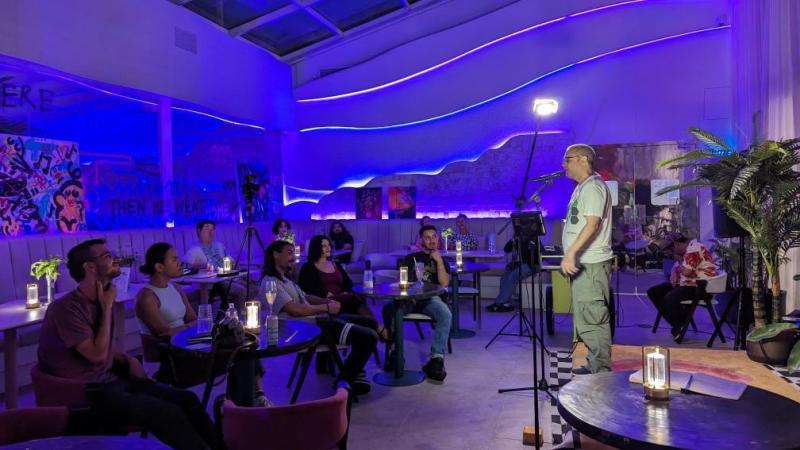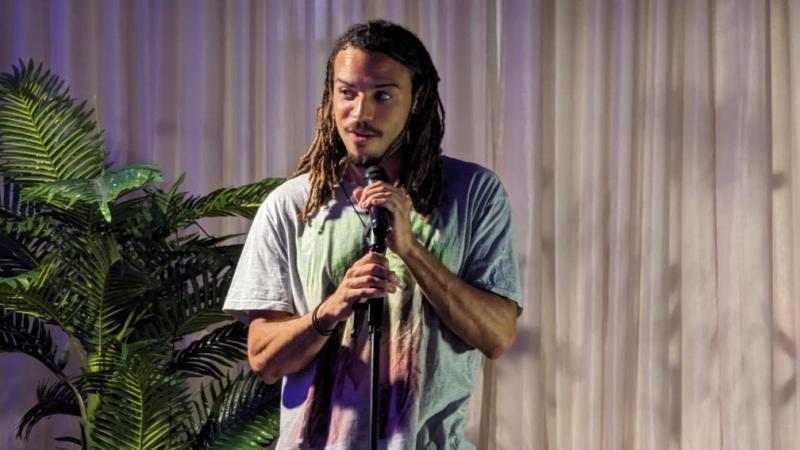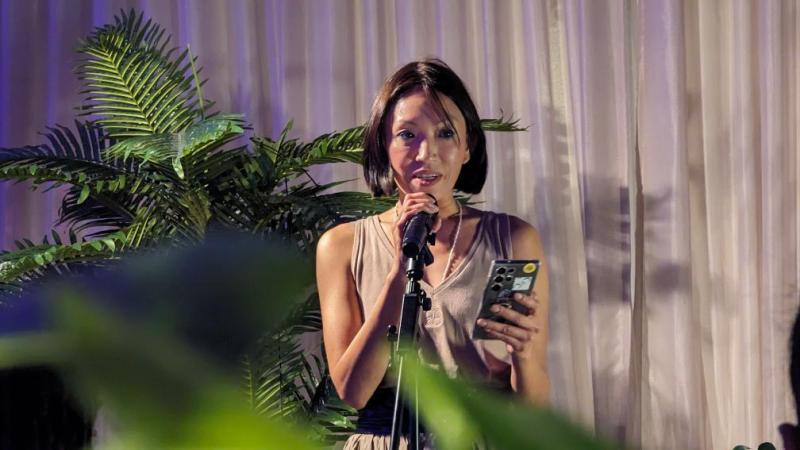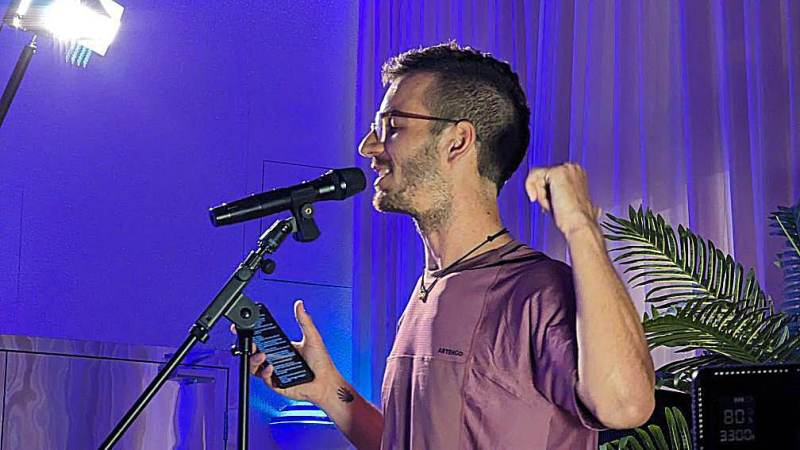Bruno Cooke attends – and participates in – a Lyrical Lunacy poetry open mic night in Bangkok, Thailand
The Fig Lobby’s lobby may be the hippest lobby in Bangkok. It’s an art hotel in the city’s Khlong Toei district. Block colours meet bold patterns. There are columns and humanoid chairs and words spray-painted on the walls. Gaudi meets Bauhaus meets Dr Seuss, with just a sprinkling of Twin Peaks’ red room. It’s the kind of place that offers mixology classes, holistic experiences, and “funkadelic” networking events, and – thankfully! – plays host to the occasional poetry open mic night.
I arrive early and immediately feel out of my depth in coolness, but Pablo, aka Pableroy, aka Leroy Jenkonius III, sets me at ease. He’s wearing a smile from ear to ear and a yellow T-shirt bearing the words, “CALLING ALL POETS” (the “all” in extra bold), which I figure is a canny, odds-improving invitation given many poets’ habit of not answering the phone. He’s the man behind Lyrical Lunacy, and a big wheel in Bangkok’s live poetry scene, but tonight he’s taking a back seat, leaving emcee duties to Asa, aka MC Ace, a drama teacher from Canada.
Pableroy brings me through to the venue, which takes the lobby’s theme and runs with it: plush-curtained window wall, spray-painted crocodiles, and a veritable copse of potted plants. Behind the bar is an only-just-SFW artist’s impression of Barbie and Ken. Purple light dances off the second largest mirror ball I think I’ve ever seen. (The first was an installation commissioned by Nile Rogers.) I put my name down and ensconce myself at a table, stage left, with a bottle of fizzy water.
I will give a brief rundown of the poetic contents of the night, but first I’d like to describe three things (besides having a vibrant, energetic master of ceremonies who is himself a creditable performer) that set this open mic / poetry night apart from others I’ve been to, and hosted. So take note, poetry event organisers. These pointers may elevate your poetry events!
Take note, poetry event organisers. These pointers may elevate your poetry events!
First, Pableroy asked us to write our names on slips of paper, scrunch them up, and place them inside a hollow ball – it may have been a coconut, once, or an orange. Asa then drew names (to wondrous, thunderous applause) to determine the running order, not all in one go but one between each act. Honestly, it never occurred to me to leave the order to chance at the events I used to run. I would desperately try to appease every poet who signed up by placing them exactly where they wanted to be placed, not first, not last, not after that guy, not after her, not after the break, and so on. I’ve also attended nights where people perform in the order in which they signed up, which also seems limiting. Or maybe it works. What do I know? Anyway, this worked here.
Second, an interval game Pableroy had affectionately dubbed GFF, the aim of which was to have audience members fill the roles in an imaginary art collective, thereby encouraging us to Go Find a Friend. The roles included Word Wielder and Image Conjurer. I used my, er, poetic licence and put down the name of a dancer, figuring dance was a way of conjuring ephemeral images with the body. Will any of the five-person teams assembled in frenzy that night ever actually collaborate on anything? I doubt it. Was it fun assembling them? Yes, it was.
Third, a project called Revolving Poem that ran for the duration of the night, which involved audience members (including performers) each penning a line or two anonymously in a communal notebook. Asa, our compère, read aloud the resulting text at the end of the evening. This made poets of non-poets and gave us all something to enjoy that was larger than ourselves (even if, true to form, my handwriting’s occasional illegibility interrupted its flow. Sorry, Ace.).
The first poet of the evening was Dominic, a Brit whose delivery evoked, just faintly, John Cooper Clarke
The first poet of the evening was Dominic, a Brit whose delivery evoked, just faintly, John Cooper Clarke. His second poem, about being a ‘Moto Matador’ – staring down a reckless motorcylist pelting it towards you in the gutter of a road and wondering who will chicken out first – charmed me with its metre-by-metre countdown (building tension! Yes!) and the repeated (but not over-) deployment of its central phrase.
Following this, three people went to the toilet, and Asa picked these three individuals, one by one, from the Name Ball.
Then came Kayla, in sequined thigh-high boots and a fabulous golden shawl. She sang three songs, including a moving original about overcoming alcoholism. Amanda sang Camila Cabello’s ‘No Doubt’, having rehearsed only once, with Asa on guitar, five minutes before the start of the show. Then we heard from Jusia, a first-time performer, who said her work was relatively shallow but whose poem ‘Who Do You Think You Are?’ (about habitually switching between English and her native Polish mid-conversation and the complications that arise from this when, say, interlocuting with someone who doesn’t speak Polish) proved otherwise.
Pableroy, who created the template for the evening almost exactly ten years ago (Lyrical Lunacy recently celebrated its tin anniversary), delivered a poem about bombings and F-22s that was the first of two to comment on Israel’s war on Gaza:
Dead man walking
Not a zombie
Face caked in pulverised concrete
Daniella, also a first timer, spoke of “ribbons of ripe flesh” and had the audience hanging on her every word.
Asa returned to the stage to perform one of his Collected Word Poems (CWPs). He writes these by inviting friends and acquaintances to feed him a set number of tricksy words and restricting himself to using these in the order given. The words he received for this particular poem included ‘Ethiopia’, ‘translender’ and ‘orthogonal’, so, you know, no mean feat. But constraints drive creativity and all that. (I gave him ‘ipsissimosity’, clever me, so we’ll see what he comes out with next.) Asa has written numerous CWPs and recommends the method. He also likes to write collaboratively, inviting likeminded friends to write with him, line for line, before taking the resulting hodgepodge and crafting it into something he’s happy with. Advice to poets struggling to write: invite external input.
Advice to poets struggling to write: invite external input
Next came Amir, performing for the first time in ten years (are you noticing a theme?), and a young man whose name I failed to jot down but who was a real firecracker with one song “about sex and mind games”:
Do me harder, daddy,
Ow! Do me harder now!
Then Michael from California, with an unusually deep voice and a fleece hat in the shape of a dog’s head, and then Jamie, whose parents fled the Vietnam War when she was very young and wound up in Tiverton, of all places. She read (in the soft unassuming voice of a woman whose poetry has never before seen the light of day) two touching poems about her experience of parenting a child with special needs.
I’ve missed out a couple of performers – thus crumbleth the cookie – but that’s the gist. Save for a few lines of Spanish and Arabic, the whole night was conducted in English (although there were Thai people in the audience). I came away with some useful pointers about how to run a successful poetry night.
What struck me most, however, was the proportion of first-time performers, or people who were reading their poetry for the first time in a decade. I felt tremendously grateful. To hear someone’s work for the first time is a gift, not only of the art itself but also of the courage and humility required to get on stage to deliver it. Having an enthusiastic and welcoming audience certainly helps, and in this way, would-be performers can help shape the environment in which they would like to share their work. A compère can do a lot, but only if the audience is willing to be worked. Overall, I came away with a deeper appreciation of the fact that a poetry night’s success rests on the performers’ and audience’s willingness to collaborate. The host’s primary role is to facilitate this collaboration. Wit and charisma are secondary. (It also helps to have a DJ play Dr Dre’s ‘The Next Episode’ as performers approach the stage. It helps a lot.) Fortunately, Asa excelled on all fronts, and the resulting dynamic was intimate and meaningful, and broke the ice for several inexperienced performers.
Somewhere in the Revolving Poem was a line that caught my ear. It inadvertently described the mood in the room at the time, and the picture I’m trying to paint: precious and kind, yet transient:
The air is full of love,
At least here, now, for us.
It made me wonder how many such nights I’ve missed out on, so far, on my travels – and how many more there are to come.
Watch Bruno perform his poem here.
You can find Lyrical Lunacy on Facebook here and on Instagram here.
Bruno Cooke is The Friday Poem’s Spoken Word Poetry Editor. He’s written one novel (Reveries, available from You Know Where), four plays and two feature screenplays. Besides writing about poetry for The Friday Poem, Bruno muses on politics and travel for his personal website, and has worked as a freelance journalist, primarily for GRV Media, since 2019. He has lived in France, China, Sri Lanka and the Philippines, working as a writer, educator and occasional chef, and likes, among other things: black and white Japanese films, pub quizzes, fermentation and baklava. In May 2023 Bruno set off with his partner on a round-the-world cycle; receive updates via his Instagram page.





